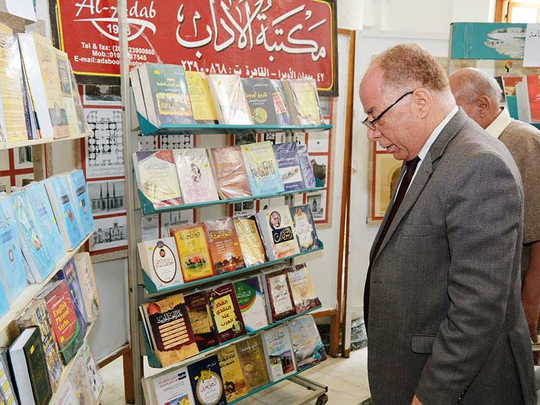
Cairo: For years, Fekry Abdul Wahab has made friends with Egyptian and other Arabs, who showed up at his kiosk in Cairo looking for books.
“Researchers used to come from around the Arab world to me asking for rare books. People would also come to buy second-hand books at very low prices,” says Abdul Wahab.
“But the good days are over,” 58-year-old Wahab adds wistfully, as he points to his stall stacked up with books in central Cairo.
Abdul Wahab is one of several sellers of old books in a market made up of rows of stalls nicknamed Sur Al Azbakia or the ‘Wall of Al Azbakia’.
The place is named after the Al Azbakia Botanical Garden inaugurated in the late 19th century in the nearby Ataba Square, home to Egypt’s National Theatre.
Originally, the market was established in the early 20th century in the vicinity of the Egyptian Opera House that was gutted in a blaze in 1970.
Over the years, Sur Al Azbakia has been relocated several times as part of government efforts to renovate the downtown.
The latest site is sandwiched between a public bus terminal and a main station of the Cairo subway system, making the area crowded for most hours of the day.
“This place is not suitable for selling books any more. It has turned into a noisy market for garments and children’s toys,” Abdul Wahab told Gulf News.
In the distance, commuters, on their way to the subway, can be seen checking clothes spread on a wooden stand. Other street vendors in the vicinity peddle copycat wristwatches and cell phones.
In rush hours, one has to jostle his way while walking in the area.
“People who look for certain books need quietude for concentration. This is also necessary for those who pass by just to have a look at the latest used books available,” says Jamal Zaki, an owner of a book stall in the area.
“This is not possible due to the narrow passageway leading to the metro station and the invasion by the vendors,” adds Zaki, who has been in the book business for more than 30 years.
“We have repeatedly asked [authorities] to move us to a quiet area. Sur Al Azbakia is an important part of Egypt’s history and culture that must be protected. But our demand has found no attentive ear,” he says.”
In recent years, Sur Al Azbakia has been a feature of the annual Cairo International Book Fair.
The Ministry of Culture also named a price-cut book fair it recently held after Sur Al Azbakia.
“Famous authors and politicians were among the clients of Sur Al Azbakia. Some of them are kind enough to emphasise importance of the Sur Al Azbakia in their interviews to the media and acknowledge its big role in providing their libraries with inexpensive books,” Zaki told Gulf News.
He and his colleagues often buy their goods from itinerant sellers of used items.
“They roam streets with their push carts and buy things that people — Egyptians and foreigners — would like to get rid of either because they plan to renovate their apartments or moving out of them. In many cases, the abandoned things include rare and good books,” Zaki says.
“We have many books as you can see, but where are the customers?”
According to Zaki, the place is not the only thing that keeps prospective customers at arm’s length.
“Cost of living keeps rising while people’s incomes remain the same. They need every pound in their pockets to feed their stomachs and not books to feed their minds.”
Last November, Egypt floated its local currency and cut state subsidy on fuel as part of harsh economic reforms.
The measures, while praised by economists, have sent prices of different goods and services soaring.
Prices of books have gone up too.
“We have not increased prices of our books in order to attract clients,” Zaki notes.
His collection features Arabic novels, religious books, English classics and old textbooks.
“Generally speaking, prices of my books are nearly half their prices in major bookshops,” he says. “Haggling is also allowed.”
According to him, the most popular among his merchandise are novels penned by young writers.
“Novels by Ahmad Murad and Ahmad Khalid Tawfik attract young readers with their exciting events and real-life language,” he says, naming two Egyptian authors.
“Translated novels of [Brazilian] Paulo Coelho are also in demand,” he adds.
“When I have no clients — which is often the case nowadays, I go inside my kiosk and read different books,” Zaki says.
“At least I don’t feel bored with them.”












